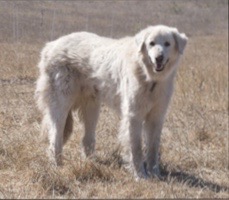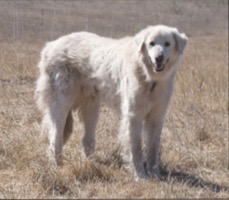
The plight of abandoned guardian dogs in Nevada’s High Desert may have a happy ending at least for one of these gentle canine giants.
“My wife and I are a retired couple with a small 1 acre farm that keeps chickens and goats we are looking to rescue a dog that will not eat our livestock please contact me if you can help.” wrote Advocate on-line reader John Herbert, of Crystal Bay California.
 With the sheep migration season over reports of large white dogs apparently lost and wandering the stretch of road between Ely and Wendover are again coming in.
With the sheep migration season over reports of large white dogs apparently lost and wandering the stretch of road between Ely and Wendover are again coming in.
According to descriptions given the dogs are most likely Akbash, a Turkish live stock guardian. Unlike herding dogs such as shepherds or collies, protection dogs as their description implies protect the herd usually goats or sheep but sometimes cattle from predators.
After reading the comment on the High Desert Advocate’s webpage, publisher Howard Copelan called Herbert and directed him to the Abash Dog Rescue in California.
 “We aren’t really dog people ourselves but what is being done to these animals I think everyone would agree is just wrong,” Copelan said. “This is the second time we played dog match maker for abandonned Akbashes.”
“We aren’t really dog people ourselves but what is being done to these animals I think everyone would agree is just wrong,” Copelan said. “This is the second time we played dog match maker for abandonned Akbashes.”
Four years before a friendly yet malnourished Akbash showed up on the doorstep of the home of Don Sutton in Pilot Valley.
“He is a beautiful well behaved large dog, looks like a Great Pyrenees,” said Sutton at the time. “He showed up at my house last week, just as friendly as you can imagine. He looks like about 18 months to two years old. I really can’t keep him but I don’t want to take him to the pound. It would be almost a sin to put him down.”
The dog had probably spent more than a month scrounging in the Nevada outback. That the animal was easy to approach is a testament to the breed. Their lineage goes back as long as 10,000 years and they are still in use and can be seen accompanying Peruvian sheepherders in eastern Nevada during the spring and summer months.
 Needing very little if any training, the dogs mingle with the sheep and fend off attacks from local predators such as coyotes, bobcats and mountain lions just as their ancestors fought off wolves, jackals and lions at the dawn of civilization.
Needing very little if any training, the dogs mingle with the sheep and fend off attacks from local predators such as coyotes, bobcats and mountain lions just as their ancestors fought off wolves, jackals and lions at the dawn of civilization.
The dogs’ success also has a tragic side however. Because they are so easily trained any pup will do and once the season is over the adult dogs guarding a particular herd are often either put down or left to fend for themselves once they are no longer needed. Used to be fed regularly and having a instinctive aversion to hunting large herbivores most of these cast offs slowly starve to death over the winter or die of cold, unless they are adopted by sympathetic humans.
Most do die but not all said Janet Davis who operates the onlyAkbash dog rescue in the country. According to Davis there have been reports of Abkash dogs going feral and breaking thousands of generations of conditioning to become hunters again.
“It is getting to be a problem,” Davis said. “There are reports of packs of large white feral dogs attacking livestock in Montana. They could be Pyrennees orAkbash.”
Both breeds were once considered rare in the United States and even in their home countries until the 1980’s when federal and state governments began to promote guardian dogs to prevent predetor attacks on flocks and herds.
 “It was a great idea but very badly executed,” Davis said. “They began to give out puppies, not spayed or neutered. They weren’t registered. It is still going on. Just this year in rural California they wanted to give farmers, unfixed unchipped Abkash puppies. They asked my opinion and I told them they were crazy. These are beautiful animals of an ancient breed. But they aren’t for everyone.”
“It was a great idea but very badly executed,” Davis said. “They began to give out puppies, not spayed or neutered. They weren’t registered. It is still going on. Just this year in rural California they wanted to give farmers, unfixed unchipped Abkash puppies. They asked my opinion and I told them they were crazy. These are beautiful animals of an ancient breed. But they aren’t for everyone.”
Davis’ dog rescue operation is unfortunately temporarily closed however a retired Abash breeder from Pahrump, Billie Miller said Wednesday that she would be willing to make the 16 hour round trip to northern Nevada if someone could round up the animals.
 “What is being done to them is criminal,” Miller said. “If someone sees the dogs out roaming and picks them up I would be more than willing to foster the dogs until a new home was found.”
“What is being done to them is criminal,” Miller said. “If someone sees the dogs out roaming and picks them up I would be more than willing to foster the dogs until a new home was found.”
The Akbash is a large dog, weighing from 75 to 140 pounds, averaging 90 pounds for the female, and 120 pounds for the male. Akbash dogs range from about 27 to 34 inches tall.
centraThe Akbash personality tends to be calm and aware. As a breed, it is not shy, nor is it aggressive. When used as a protection dog, it is suspicious of strangers in its territory, and unusual sounds and changes in its environment. The breed is not naturally hostile, and is, instead, naturally discerning, bred to think independently. The Akbash can be powerful against predators, yet, when properly exposed, be gentle with newborn lambs and goat kids. The usual first means of protection by an Akbash is prudently warning potential threats by barking or growling. The Akbash will chase away a predator, or physically protect against it, only if it deems that wise and necessary.
While considered an excellent companion dog it sometimes does not have a chance.
“Agents actually tell farmers and shepherds not to interact with the dogs,” Davis added.


I am glad to hear this good news. FYI the dog you mentioned about with Don Sutton is alive and well. He his loved and has a happy life with us.